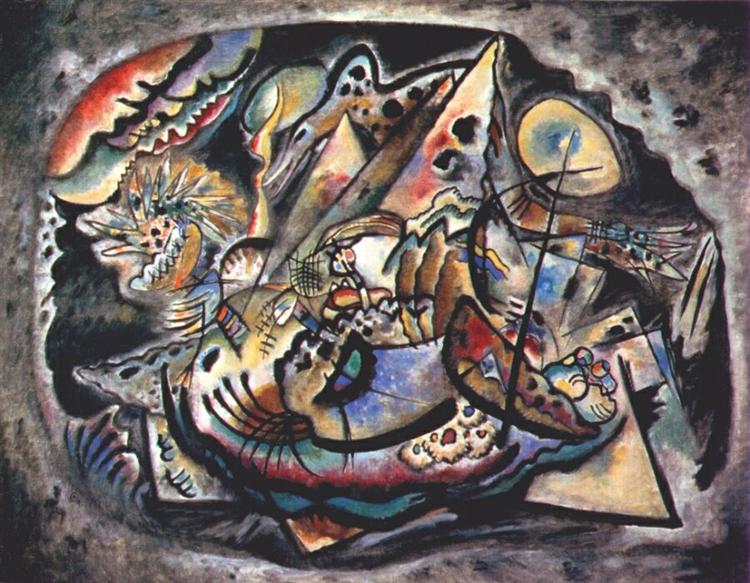Description
The work "Gray Oval" by Wassily Kandinsky, made in 1917, represents a significant milestone within its artistic career and the development of modern art. Kandinsky, one of the pioneers of abstract painting, is characterized by his ability to evoke emotions and sensations through shape and color, a language that learned to dominate throughout his career. In "Gray Oval", color exploration becomes an intimate dialogue with the viewer, offering a visual universe that transcends the figurative representation.
The composition of "gray oval" is, because of its essence, a reflection on form and space. In the center, the great gray oval stands out in the midst of a more complex and textured background, which invites the viewer to contemplate not only the form itself, but also the interaction of it with its environment. Kandinsky uses a colored palette that, although predominantly gray, is accompanied by touches of more vivid tones that add depth and dynamism to the work. This choice of a neutral color, such as gray, can be interpreted as an attempt to achieve a form of spirituality or transcendence, stripping the work of superfluous distractions.
The oval form has been subject to multiple interpretations in the context of abstract art. It can symbolize the cycle of life, eternity, or even the soul itself. Gray, in this context, acquires a singular meaning: it represents the search for a balance between light and shadow, between the tangible and the intangible. This work is at a particularly interesting moment in Kandinsky's life, who, after having experienced with a vast range of styles, is strengthened in its inclination towards simplification and formal purity, topics that would become central in their subsequent work .
Although "gray oval" lacks human figures or explicit narrative elements, this does not decrease its visual impact. The absence of characters allows the work to become a space for introspection and contemplation. The viewer faces an emotional landscape, where shapes and colors become vehicles of personal expression. Kandinsky, influenced by his interest in music, considers that each color and shape has its own "sound" and emotion; In this sense, the gray oval seems to resonate in a low and deep tone that invites meditation.
The work is representative of Kandinsky's transition towards a purest abstraction, a step that can be linked to other works of the time, where his search for autonomous visual language is evidenced, free of direct references to reality. paintings As "Composition VIII" and "Improvisation 31" they share that philosophy of raising forms over narrative content, reaffirming the idea that visual experience can be so powerful or more than any story told.
In conclusion, "Gray Oval" is erected not only as an outstanding piece within Kandinsky's corpus, but also as a work that captures the essence of abstract art in its purest form. The work invites the spectator to immerse himself in his own inner world, using painting as a means to explore emotions and spirituality, without the limitations of the figurative. In the context of modern art, Kandinsky is positioned as a true innovative, and "gray oval" is a testimony of his ability to communicate through the silence of shape and color.
KUADROS ©, a famous paint on your wall.
Hand-made oil painting reproductions, with the quality of professional artists and the distinctive seal of KUADROS ©.
Art reproduction service with satisfaction guarantee. If you are not completely satisfied with the replica of your painting, we refund your money 100%.

